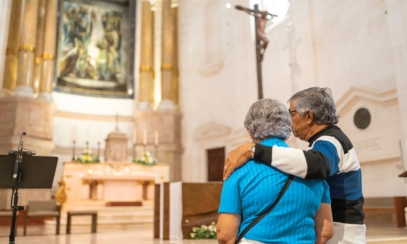
Can we have a sense of humor about God?
The catechism defines blasphemy as “directly opposed to the second commandment. It consists in uttering against God — inwardly or outwardly — words of hatred, reproach, or defiance; in speaking ill of God; in failing in respect toward him in one’s speech; in misusing God’s name.” My issue is that humor about God would seem to be blasphemy by this definition, even if it is not done out of hatred or anger towards God. This is particularly hard for me, because humor is an important part of all my close relationships, and it is very hard to have a meaningful relationship with the Lord if I have to exclude many kinds of humor from it.
Thank you very much for your email and question. I am moved by your depth of thought and eloquence in expressing your question. It is clear you have put a lot of thought into not only this question, but in your investigating and interiorizing the faith.
I see a couple of questions rising to the surface in your question.
I initially wanted to examine the nature of humor. C.S. Lewis has a section in his book The Screwtape Letters where he discusses the various kinds of humor and how most levels of humor are less harmful than many serious people think they are. I would look at the way that most humor turns on incongruity or apparent paradox, and how we are more often laughing at the incongruity than we are at the content of the joke. But that still doesn’t get us very far in this discussion.
The expression “failing in respect toward him in one’s speech” is the key phrase here. Taking a look at it in light of what I think you are asking regarding jokes and being able to laugh with God, the crux would seem to come down to the definition of “respect.”
You and your friends can joke around and make fun of each other because there is implicit and explicit respect in your relationship. If there weren’t, the words you say to each other would be considered spiteful, rude, or even cruel. But the context of the conversation is between people who have a good relationship and who respect each other. It is only because you respect each other that the ribbing and teasing is actually funny.
Expand this to parents. Parents have a natural and spiritual authority over their children. Therefore, children are to respect and obey their parents. Is it possible to love, respect, and obey someone in authority over you and still be able to joke around with them? It seems to be entirely possible. And it often happens.
There can come a time when sons and daughters joke around with their parents, even to the point of poking fun at their quirks or something silly their parents once did. (“Remember that time Mom fell into the lake trying to get into the boat? And how Dad couldn’t pull her into the boat, so he just called out instructions to her while she swam to shore?”) This is only funny if there is a healthy and loving relationship between parents and children.
More than this, humor/joking/teasing can even be something that grows and enhances the relationship; just think of the good that can come from sharing mutual laughter about our mutual family. But, once again, it is only an actual “joke” to the extent that genuine love and respect are present.
Now, when it comes to the Divine Being Who Is Lord of All, is it possible to have a sense of respect and a sense of humor?
Note that while we can make the analogy between the relationship we have with our earthly parents and our relationship with our Heavenly Father, God is still, well, God. Because of that, it would be wise to venture ahead with care.
Too many people dismiss the seriousness of this point by merely jumping to the “God can handle jokes about him” posture. Yes, God can “take it.” But that is not the issue. The issue is whether love, obedience, and respect are present in our speech and actions regarding God and all that belongs to him.
God is owed all awe and respect possible. There is no way that we could ever truly understand the depth of respect and reverence we owe to God. When I stop to think of the times when God revealed himself in the Old Testament, any temptation to reduce God to “buddy status” seems like absolute foolishness. The children of Israel begged Moses to be the one who spoke with God on their behalf because they were so struck with fear, awe, and reverence when God’s presence descended on Mount Sinai. Any half-hearted reverence on our part reveals that we have no real idea who God really is and who we are in relation to him.
Yet “relationship” is the key word. This same God of the Universe is also the Word Made Flesh who dwelt among us, so that we can be in real and personal relationship with him. He desires to make all people on earth his children, and he desires that his children come to him in loving trust as their Abba (“Dad”) in heaven. And real relationships involve all of the elements of, well, real relationships. This would seem to necessarily involve humor.
God made humor. Satan did not. Satan can only distort the good of humor. Like any other good thing that God has made, learning to properly use this gift is essential to its flourishing. Therefore it seems to me that there can be, even with God himself, a good and joyful balance between a sense of respect and a sense of humor.
So, is there room for laughing with God?
Yes. There is room for this because a healthy relationship with God must be a real relationship. And a real relationship often (if not always) involves sharing what a person actually thinks, including what one finds odd or silly or incongruous. Of course, there is a limit. Not everything that one finds funny has a place in every relationship. The determining factor is knowing the reverence we owe to God and striving to make sure that our language always reflects the respect we owe him.
Father Michael Schmitz is director of youth and young adult ministry for the Diocese of Duluth and chaplain of the Newman Center at the University of Minnesota Duluth. Reach him at fathermikeschmitz@gmail.com. Reprinted with the permisssion of the Diocese of Duluth's Northern Cross newspaper.



